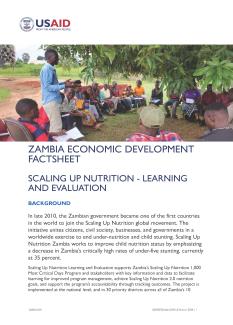In late 2010, the Zambian government became one of the first countries in the world to join the Scaling Up Nutrition global movement. The
initiative unites citizens, civil society, businesses, and governments in a worldwide exercise to end under-nutrition and child stunting. Scaling Up
Nutrition Zambia works to improve child nutrition status by emphasizing a decrease in Zambia’s critically high rates of under-five stunting, currently
at 35 percent.
Scaling Up Nutrition Learning and Evaluation supports Zambia’s Scaling Up Nutrition 1,000 Most Critical Days Program and stakeholders with key information and data to facilitate learning for improved program management, achieve Scaling Up Nutrition 2.0 nutrition goals, and support the program’s accountability through tracking outcomes. The project is implemented at the national level, and in 30 priority districts across all of Zambia’s 10 provinces. Scaling Up Nutrition Learning and Evaluation provides survey, research, evaluation, and dissemination services to the Government of the Republic of Zambia Scaling Up Nutrition program, including the USAID Scaling Up Nutrition – Technical Assistance activity, which seeks to reduce childhood stunting in Zambia.
GOALS
GOAL ONE
Conduct baseline, midline and end line surveys for Scaling up Nutrition 2.0 with the survey protocol
and methodology approved by the Technical Working Groups and USAID
GOAL TWO
Conduct focused studies with the learning agenda approved by Technical Working Groups and
USAID and conduct biennial performance audits of Scaling Up Nutrition 2.0
GOAL THREE
Create a culture of learning and adaptive management under Scaling Up Nutrition 2.0
- Life of Project: November 2018 - August 2024
- Geographic Focus: Nationwide
- Partner: Khulisa Management Services, Inc.
- Chief of Party: Mathews Onyango
- Total USAID Funding: $15.6 million
- USAID Contact: Harry Ngoma - hngoma@usaid.gov
KEY RESULTS FOR 2023
● 11 out of the targeted 25 national-level stakeholders reported that the application of Scaling Up Nutrition Learning and Evaluation generated knowledge was used to inform program decisions/policies or to take corrective action
● All 30 of the targeted districts demonstrated improvements in Performance Audit scores
● All 30 of the targeted districts made adjustments in Scaling Up Nutrition interventions (planning, goals, design) informed by data
● 233 out of the targeted 500 stakeholders reported that the Scaling Up Nutrition Learning and Evaluation output reinforced or validated existing knowledge
● 237 out of the targeted 400 stakeholders reported that a Scaling Up Nutrition Learning and Evaluation output provided them with a new knowledge
● 10 out of the 10 targeted Scaling Up Nutrition 2.0 channels/platforms reported sharing information or data

